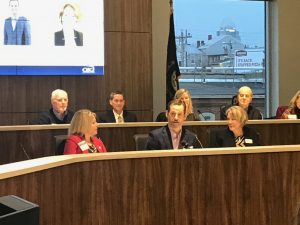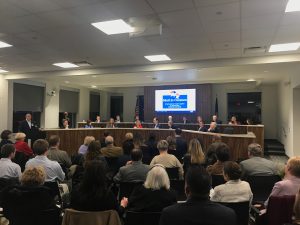By Mark Hansel
NKyTribune managing editor
The Cincinnati Metropolitan Statistical Area (MSA) includes counties in three states, with a diverse range of economic, social and cultural issues, and distinct identities.
Just within Northern Kentucky, there are urban cities, residential enclaves, rural communities and some areas that are more difficult to define.

OKI ‘Much in Common’ panelists (l to r) Kimm Lauterbach, president and CEO of REDI Cincinnati; Lee Crume, president and CEO of Northern Kentucky Tri-Ed; and Terri Randall, president and CEO of One Dearborn (photos by Mark Hansel).
Residents of the cities, towns, and unincorporated areas throughout the region view with pride the characteristics that make each of their communities unique in its own way.
When it comes to improving quality of life and promoting economic development and tourism, however, successful MSAs are increasingly focused on the common elements that connect a region.
To that end, more than 100 elected officials, residents and community stakeholders attended the first “Much in Common” event at the Kenton County Administration Building Thursday evening.
Much in Common is a new initiative from OKI that brings regional leaders together to discuss collaborative strategies to improve the quality of life in the Greater Cincinnati area.
The topic of the initial meeting was economic development.
Panelists included Kimm Lauterbach, president and CEO of REDI Cincinnati; Lee Crume, president and CEO of Northern Kentucky Tri-Ed; and Terri Randall, president and CEO of One Dearborn.
OKI is a council of local governments, business organizations and community groups. Its goal is to develop collaborative strategies, plans and programs to improve the quality of life and economic development potential of the tri-state.
Mark Policinski, chief executive officer of OKI said collaboration is the key to success.
“We’re here tonight to witness and to celebrate the power of ‘us,’” Policinski said. “By being here…I think you’re buying into the fact that the best way to solve the problems that confront our communities, our jurisdictions, is by working together.”

Kenton County Judge/Executive Kris Knochelmann, a member of the Much in Common Committee, moderated Thursday’s discussion.
The event was sponsored by Duke Energy.
Rhonda Whitaker Hurtt, vice president of communications for Duke Energy, said the company was excited to sponsor the Much in Common series.
“All of these topics are of significance to the whole region,” Whitaker said. “They are important to businesses and government alike. As our Cincinnati metropolitan region continues to prosper, it’s only through great collaboration, and there is no one that collaborates better in this region than OKI.”
Kenton County Judge/Executive Kris Knochelmann moderated the event.
In response to a question about economic development trends, Crume said REDI Cincinnati is about to roll out a strategic plan for the Cincinnati MSA that will benefit everyone.
“We have certainly studied that to try to understand what strengths and weaknesses we can play off of,” Crume said. “To see how we can leverage strengths that Kimm’s organization brings to the table (and) various organizations bring to the table.”
Lauterbach said there has recently been a shift, or disruption, from the traditional methods of promoting economic development.
“Economic development is now all about talent, which is very different for those of us who have done this for a while,” Lauterbach said. “Technology disruption, whether it’s the Amazon Prime Air hub and what they are going to be bring to this community and the entire region, or some of the tech innovation companies, that are coming.”

An overflow crowd of more than 100 elected officials, business leaders and community stakeholders are on hand for the OKI Much in Common session at the Kenton County Administration Building Thursday evening.
REDI Cincinnati, which is just in its sixth year of existence, is an example of how the promotion of economic development has changed.
“We just completed our first-ever strategic plan,” Lauterbach said. “We (went from) building the bus and barreling down the highway at 100-miles-an-hour, to taking a step back and saying, ‘we’ve had this success, now where are we going as a region and how can we help guide that.’”
Randall said that Dearborn County, in southeastern Indiana, is a small part of the Cincinnati MSA, but there is a lot of opportunity there.
“In some ways, I think, in Southeast Indiana, we’ve been challenged to come together and really embrace regionalism, and we’re really starting to get that,” Randall said. “As moneys decline and governments have to operate on less money all the time, we’ve got to figure out ways to partner.”
Crume said the priority of companies looking to relocate to a region have changed as well.
“If you go back five or six years and you were out working with a client, talking about things like lifestyle, or quality of life, you would have been practically laughed out of the room,” Crume said. “The industry was selling capacity. The unemployment rates have come down, you don’t have the untapped labor pools, and understanding the quality of life element…is an incredibly important part of our jobs today and an incredibly important challenge that the region is going to have to face.”
Panelists said economic development is also driven by population growth and the Cincinnati MSA is growing at a slower rate than the regions it competes against.
Nashville, for example, is growing at 20 percent per year and Columbus is also experiencing double-digit growth. Indianapolis and Charlotte are also growing faster than the Cincinnati MSA.
“You’re either growing, or you’re dying and I think communities can make a conscious choice of which side you want to be on in that equation,” Crume said.
Topics that were seen as potential barriers to economic development included access to transportation, and attainable housing, for the region’s workforce, and site availability for companies looking to locate in the region.
Contact Mark Hansel at mark.hansel@nkytrib.com
















